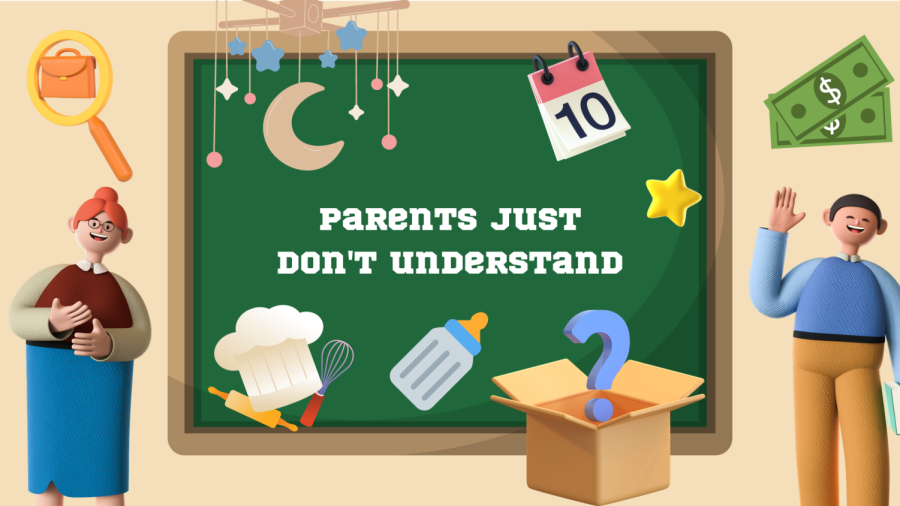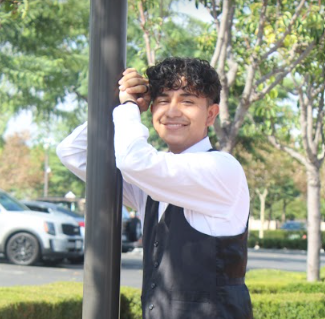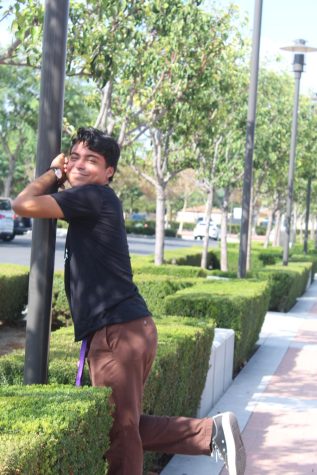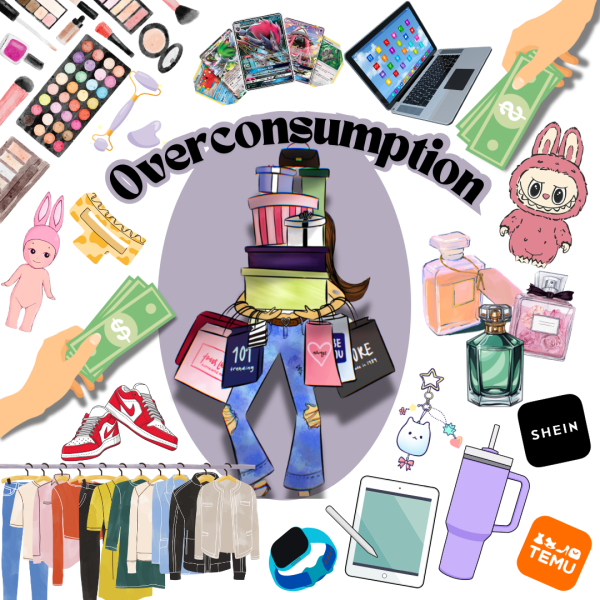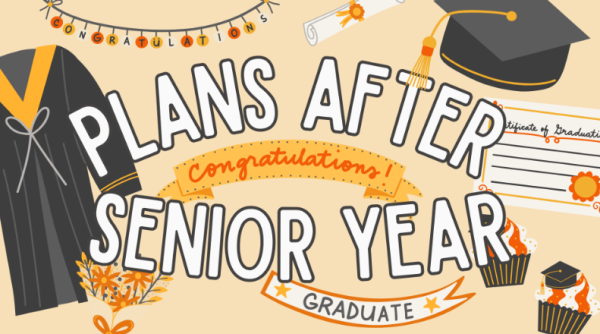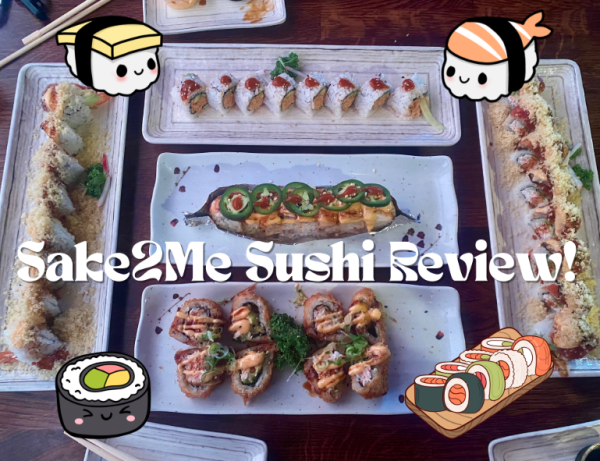Parents just don’t understand, Part II
Esmeralda Coeto Medina (created with Canva)
In Part II, our podcasters’ families respond to their audio diaries from Part I.
TRANSCRIPT:
JUAN ALVARADO: Welcome back to “Three and a Half Villagers” and the much awaited part two, “Parents just don’t understand,” where we show our parents’ reaction and opinion to the part one of this series. Here we have each podcast member’s parents/siblings perspective of our audio diaries. We asked them some questions and wanted to see what their high school or education life was like for them compared to ours. I hope you guys enjoy!
J. ALVARADO: Hello, so the interviewees we decided to do was Fernando Rubalcava, Luis De Santiago, Stephanie Cabral, and Olga Zamora. This is Olga Zamora, Juan Alvarado’s mom.
J. ALVARADO: What is your reaction to the podcast?
OLGA ZAMORA: Si, si es un dia muy pesado tienes razon pero tambien como te he dicho, si tu estas trabajando es porque tu quieres, para ti y para tus cosas personales porque tu sabes que si tu trabajas es porque tu decidiste trabajar. Yo te lo he dicho y como te lo hemos dicho nosotros la prioridad para nosotros es la escuela. Si tu te sientes cansado y eso no tienes que trabajar. Para mi es más importante la escuela, que estudies, te superes y sigas adelante. Yo se que hay veces que te quedas tarde hacer tus estudios y tus exámenes y aveces te estoy regañando porque pienso que nomas estas en la computadora nomas jugando pero no es de la escuela y esta bien yo entiendo, pero tambien tienes que ver si estas cansado no trabajes eso es lo que yo pienso.
NAYELI ALVARADO (translating for Olga Zamora): Yes, it is a very hard day; you are right but, also as I have said, if you are working it is because you want to, for yourself and for your personal things because you know that if you work, it is because you decided to work. I have told you, and as we have told you, the priority for us is the school. If you feel tired, then you don’t have to work. For me, school is more important, that you study, improve yourself and move on. I know that there are times when you stay late to do your studies and exams, and sometimes I’m scolding you because I think you’re just playing on the computer, but it’s not, it’s for school and that’s fine, I understand. You also have to see that if you’re tired don’t work, that’s fine; that’s what I think.
N. DE SANTIAGO: What extracurricular activities would you do inside or outside of school?
ZAMORA: Cómo cuidar niños o trabajar hacia mas que nada trabajando porque trabajaba mucho con mi mama.
N. ALVARADO: Like taking care of children and working, I did more than anything working because I worked a lot with my mom.
J. ALVARADO: This is Luis de Santiago, Noe De Santiago’s dad.
J. ALVARADO: Give us an overview of a day in your life back then.
LUIS DE SANTIAGO: I used to wake up like around 6:30 in the morning, take a quick shower, breakfast, go to school for my first practice. Then we would finish like around 8 and then go to my first period.
BRANDON RUBALCAVA: How did your parents view your experience when you were in high school?
L. DE SANTIAGO: Um, it was hard cause I didn’t see them a lot (laughs), so basically I didn’t know. And um, but they would tell me the same thing: “Why are you tired? You just go to school; but they don’t recognize every single thing that you have to do which is study, try to keep your grades up, and do sports.
J. ALVARADO: This is Stephany Cabral, Daniel Cabral’s sister.
DANIEL CABRAL: What do you think is the difference between your educational experience and mine?
STEPHANY CABRAL: I think the experience is a little bit different in the sense of, like, I think I kind of prep my parents to for what to expect. Like, they saw it first and maybe I had to, like, push a little bit harder for them to respect my space and my time with school. And understand what a priority it is. So I think that’s huge. And I think another thing is, like, for you, you were in sports since you were little. You did Karate.
D. CABRAL: Yeah.
S. CABRAL: And part of that, like, really helped you become more open, more disciplined, and just change. And I feel like I didn’t have that. So maybe for me, you know, trying out for sports and high school was way harder. I felt like I just didn’t know anything and I feel like because you were the second one, you kind of already, my parents already went through that, then you kind of were already kind of paved a path a little bit. Not that it was easier because I don’t think it’s like going out and getting an education is easier because I know you’ve worked just as hard, but I think there was a little bit of a more paved way for you.
D. CABRAL: Yeah. And I totally agree with you paving the way because when I was doing my college applications…
S. CABRAL: Mhmm.
D. CABRAL: That supported just, like, you know, you checking my list of colleges. Like, oh, we should go here. Look more into those colleges. This and that was just more helpful because I do have counselors and teachers. But, you know, I could just call you up whenever you get that help.
D. CABRAL: What would you do differently now that you couldn’t back then?
S. CABRAL: I think I would be more unafraid, try new things, because I think when you, when you’re going into high school sometimes. At least for myself, I thought, you know, I can’t try this because I’m not gonna fit in or I’m not gonna be able to do it or I’ve never done this before or what are people gonna think or maybe I’m not this or that. And I think the biggest thing was looking back now, I wish I would have just done all of it fearlessly because you don’t have anything to lose. You’re so young. You’re you’re capable of so much I think that’s my biggest thing. Don’t be afraid. Don’t care what anybody thinks. Like, as long as you’re doing the right thing for yourself, you know, following what you like. Doing what you like, sports or clubs or talking to new people, I think it’s only gonna help you in the long run.
D. CABRAL: Now, we’re nearing the end. Anything else you would like to add?
S. CABRAL: I think something that’s important for myself and um, I know, like, you do Big Brothers, Big Sisters. I think that’s so important and so great. And I think if anybody does have the opportunity to mentor somebody or to help out, like, I think it’s so great that you’re doing that because not everybody has a big sister or a big brother. And, like, you taking I know it takes, like, dedication to go out of your way. I know sometimes for myself when I was in a club, I’d be so lazy and I would be like, I just wanna go home. Like, I don’t wanna deal with this. We know the fact that you go out of your way to do a Big Brother Big Sister. Like, that’s huge. And I think if I could, um, you know, share, like, something positive, it would be, like, for other people to also do that. If you can, if you have a little brother or a cousin or you meet somebody who, you know, is going through high school and they’re struggling. It’s their first year or even in college. You know, help out, like, help people, like, help your friends. Um, you know, it doesn’t hurt or doesn’t cost you anything to lend a hand. Especially once you’ve gone through high school and you know how everything works. Um, so I think that would be my biggest thing to help other people out. Just be the person you wish you had when you were there.
J. ALVARADO: This is Fernando Rubalcava, Brandon Rubalcava’s dad.
B. RUBALCAVA: How was your experience in high school? Did you have any outside responsibilities? Work, babysitting?
FERNANDO RUBALCAVA: First thing in the morning, we used to wake up at 7a.m., because classes started at 8, but we used to, we had to help our dad feed the cows and the animals we had on the farm. And then uh, we used to wake up at 6:30, 7 o’clock, so we had to do all that before we went to school. And then after like 15 minutes, uh, so school was about 15 minutes away from my house, so we just walked to the school. And then we just stayed in school for five hours. We used to get there and start first periods, you know, which usually in elementary school was all the same, so they got science classes and uh, math and all the classes were in the same classroom, so the same teacher. It wasn’t different, so we stayed there for five hours. And then we got our recess at uh, I think it was from 11:30 to 12, and we stayed there another hour after the recess and then we’d go home. After we got home, you know, we started helping my dad again and doing some helping on the farm. I would feed the animals, you know, and then do some harvest too, food and everything. Then uh, we stayed there. I was still working at probably 6, 7 o’clock. And after that, we just get in the room, watch some TV, and then just fall asleep.
D. CABRAL: This marks the end of our two-part saga. Thank you for listening to this passion project recorded and edited by Juan A., Brandon R., Noe S., and Daniel C. Thanks to the resources journalism provided we were able to make this possible. We also encourage listeners to keep an eye out for future projects along with many of the insightful articles on The Spellbinder website. This is a three-and-a-half villager signing out. We’ll catch you next time.
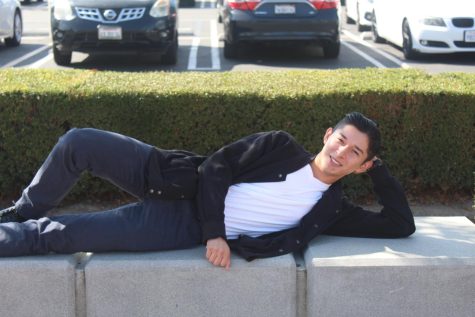
I’m Dan the CTE man, I bike to school, and I have a large collection of video game consoles.
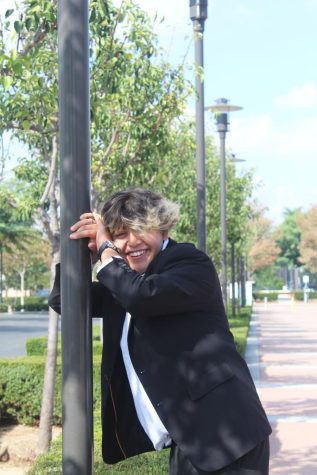
I thoroughly enjoy drinking jamba juice, I'm a huge USMNT fan, and I have a horrible music taste.
































